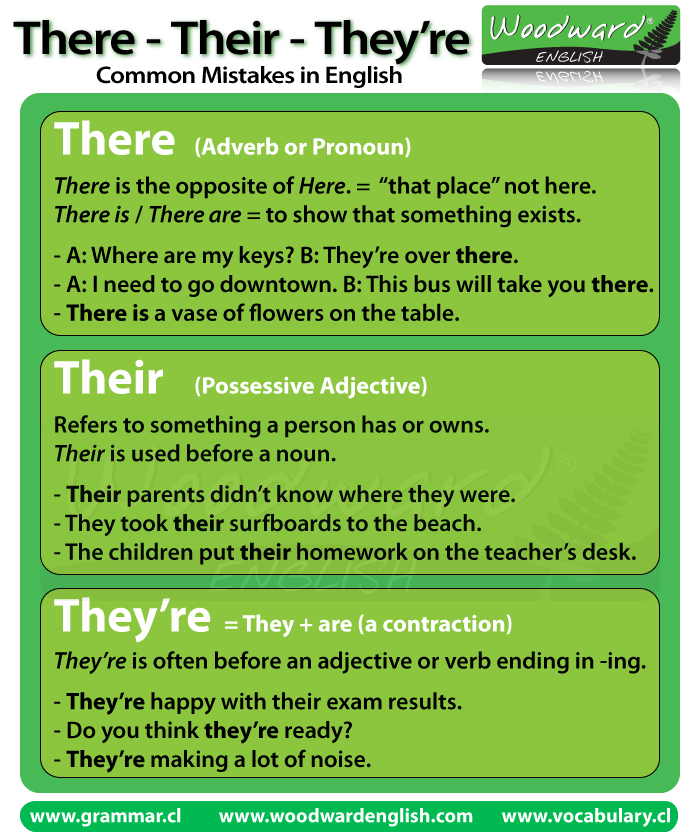

– “there” can also be used as a pronoun, showing that something exists. – here, “there” refers to a certain point during an activity.Įxample 5: There are two shopping malls in this city. – “there” can be used to show availability or presence of something.Įxample 4: If you feel tired during the game, stop there and don’t go for a next round. – the same adverb “there” can also be used to indicate a certain direction in order to make someone else look towards it.Įxample 3: The money is there for you whenever you need it.

– “there” is mainly used as an adverb, referring to a particular place/location.Įxample 2: Put the flowers in the vase on that table over there. You’ll definitely get a better understanding of all these explanations by reading the examples below:Įxample 1: They moved to London because their son decided to settle there. In this case, “there” is used to show that something exists, or something is happening. More specifically, in a particular expression. Sometimes, “there” may also be used when referring to a certain point or time during an activity or a process.įurther, besides functioning as an adverb, “there” may function as a pronoun in certain contexts. To be clear, “there” is mainly used as an adverb, expressing a location or a particular place.īut it can also be used when indicating direction, when pointing or referring towards something in order to bring another’s attention to it or when referring to something available or present. While “their” is a seemingly simple word, with two distinct uses and a clear meaning, “there” is a little bit more complex, in regard to the contexts where it may appear. – “their” is a pronoun used to show belonging or relation to a certain group of people.Įxample 2: Did that person give you their name or their phone number? – “their” may also be preferred in order to avoid using “his” or “her” when referring to something belonging or relating to a particular person.

The same word can also be used for something that belongs or relates to a particular person, when using “his” or “her” might be inappropriate, or irrelevant.Įxample 1: Our friends and their children will join us for dinner tonight. More exactly, it is used to show belonging or relating to a certain group (of people or animate beings). “Their” is a pronoun, mainly used as a determiner.

To see all the meanings of each, as well as their grammatical functions, check the two dedicated sections below, where you will be able to find some great illustrative examples. One is a pronoun, whereas the other is an adverb. In fact, “their'' and “there” are two different words, and not only do they have completely different meanings and uses in sentences, they also fall into different grammatical categories. They may sound similar and they may have similar spellings, yet “their” and “there” have nothing in common in regard to their definitions. They're always means "they are." Their is the possessive form of they.The quick answer is no! They don’t mean the same thing. It has the word here in it, which is helpful because it's often about location. They're not an easy group of words, but with practice we know you can master their distinctions. Associate Editor Emily Brewster explains its usage in this video.Īnd there you go. Their also has a long history of being used as a singular pronoun. The last of this trio, their, is the possessive form of they, so it has to do with what belongs to, relates to, or is made or done by certain people, animals, or things: They're (=they are) two of our biggest problems. They're (=they are) both really good books. They're (=they are) the cutest puppies ever. They're is a contraction that means "they are." You can remember that apostrophes indicate the possessive only when used of 's, such as "the writer's thoughts." Otherwise, it's generally a contraction of two words, as in can't = cannot, or won't = will not, or an omission of a letter or letters, as in singin' for singing and 'em for them in stick it to 'em. They key is discerning between the contraction for "they are" (they're) and the possessive of "belonging to them" (their). The other two are trickier because they both have the idea of the plural in them. It's also the one to use as the first word in sentences that have the subject after the verb:Īnd it's the one used with the verb be at the beginning of sentences and questions: It's about location in the more abstract sense too: It can remind us that this particular there is often about location: That one has the word here in it, which is helpful. While they're not an easy group of words, with practice you can master their distinctions. There's no need to confuse there, they're, and their.


 0 kommentar(er)
0 kommentar(er)
